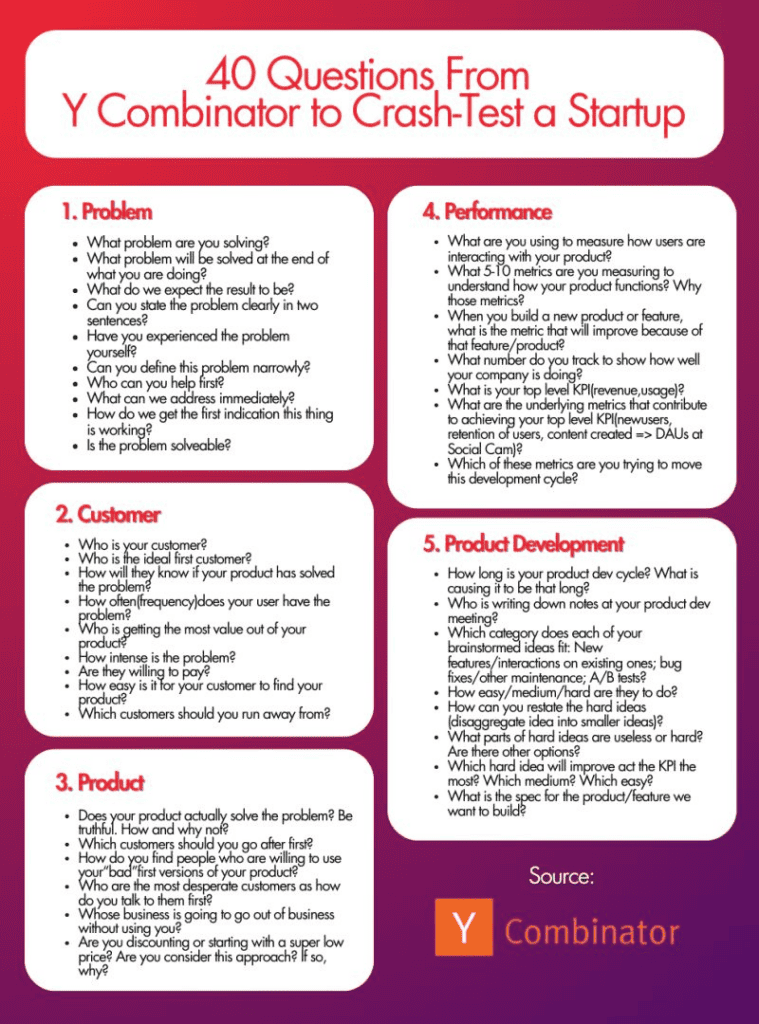
In the dynamic world of startups, founders often excel in the art of pitching their ideas, weaving compelling narratives, and creating visually appealing presentations. However, the challenge for potential investors lies in separating the wheat from the chaff and uncovering the truth behind the well-crafted facade.
Y Combinator, a renowned startup accelerator, has devised a set of crucial questions to serve as a litmus test for startups seeking investment. By delving into these questions, investors can gain valuable insights into a startup’s viability and potential for success.
- “Who can you help first?”
Understanding a startup’s target audience is paramount. By asking this question, investors can gauge the founder’s ability to identify and focus on the right customer segment. A well-defined target audience indicates a strategic approach to market penetration and a higher likelihood of meeting user needs. - “How often do they have the problem?”
Successful startups address genuine pain points in users’ lives. By probing into the frequency of the identified problem, investors can assess the depth of the founder’s understanding of the user’s pain points. A startup that comprehends the regularity of the problem is better equipped to offer a lasting and impactful solution. - “What metric will improve with this feature?”
Every feature a startup develops should contribute to measurable improvements. By asking this question, investors can evaluate the founder’s grasp on key performance indicators (KPIs) and their ability to assess the impact of each product feature. A well-thought-out response demonstrates a data-driven approach to product development and a commitment to delivering tangible value. - “How long is your product development cycle?”
Realism in expectations is crucial for the success of any startup. By inquiring about the product development cycle, investors can discern whether the founder has a pragmatic understanding of the time and effort required to bring a product to market. This question serves as a safeguard against falling for overly optimistic projections that may lead to disappointment down the road.

Conclusion
In the dynamic world of startup investments, asking the right questions is paramount for making informed decisions. The 40 questions from Y Combinator outlined above serve as a comprehensive toolkit for investors seeking to peel back the layers of a polished pitch and assess the true potential of a startup.
Investing in a startup involves more than just evaluating the product or service—it requires a deep understanding of the team, market dynamics, financial health, and long-term vision. The questions cover a spectrum of critical aspects, from customer acquisition strategies to legal compliance, ensuring that investors leave no stone unturned in their due diligence.
Founders who can answer these questions with clarity and confidence demonstrate a profound understanding of their business, its challenges, and the strategies in place for sustainable growth. On the flip side, evasive or unclear responses may raise red flags and prompt investors to dig deeper.
As the startup ecosystem continues to evolve, the importance of a thorough examination of potential investment opportunities cannot be overstated. The 40 questions provided by Y Combinator serve as a guide, empowering investors to navigate the complex landscape of startup investments with wisdom and prudence.
Ultimately, the success of an investment hinges on the alignment of values, vision, and execution. By incorporating these questions into their due diligence process, investors can increase the likelihood of identifying startups that not only have promising ideas but also the resilience and strategic foresight to thrive in a competitive landscape. In the ever-changing world of startups, asking the right questions can be the key to unlocking hidden potentials and making sound investment decisions.



